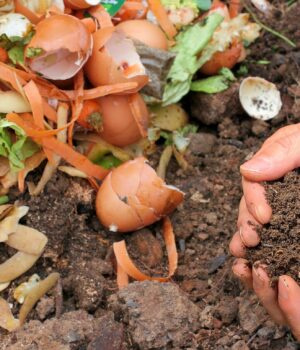Making compost at home is an effective and sustainable way to reduce organic waste in our kitchen and create a natural fertilizer for your plants. Here is a step-by-step guide to making compost at home:
Necessary materials:
- Compost bin: You can use a purchased compost bin or simply make one with materials like wood, pallets, or even wire.
- Brown material (carbon):Dry leaves, straw, cardboard, paper (without bright ink), twigs. These provide necessary carbon.
- Green material (nitrogen):Kitchen scraps (fruits, vegetables, eggshells, coffee grounds), grass clippings, fresh plants. These provide nitrogen.
- Air and Water:Make sure it has enough aeration and maintain adequate humidity.
Although we must recognize that technology helps us and there is wonderful equipment to make compost.
Follow these simple steps to make your compost:
- Select a place for compost:
- Find a well-ventilated area, preferably outdoors and accessible from your kitchen.
- Add brown material:
- Start with a layer of brown material to provide structure to the compost. Add a layer at least 15-20 cm thick.
- Add green material:
- Place a layer of green material on top of the brown layer. Alternate layers of brown and green material to balance carbon and nitrogen.
- Keep your balance:
- Add material to the compost regularly to maintain a proper balance. Avoid adding meat, dairy products and fatty foods.
- Aeration:
- Stir it every few weeks to provide aeration and speed up the decomposition process.
- Humidity:
- Keep the compost moist, but not soggy. If it is too dry, add water. If it's too wet, add more brown material.
- Decomposition Time:
- Depending on conditions, the compost can be ready in a few months. You'll know it's ready when it smells fresh, earthy and looks dark and crumbly.
- Use your compost:
- Once it's ready, use it in your garden or pots. It is an excellent natural fertilizer and improves soil quality.
- Ongoing Maintenance:
- You can continue adding materials throughout the year to keep the composting process going.
Remember that each home composter may be unique, and you may need to adjust your process based on the specific conditions of your location and the materials available. Making compost at home is a simple and effective way to reduce waste and improve the health of your garden!








